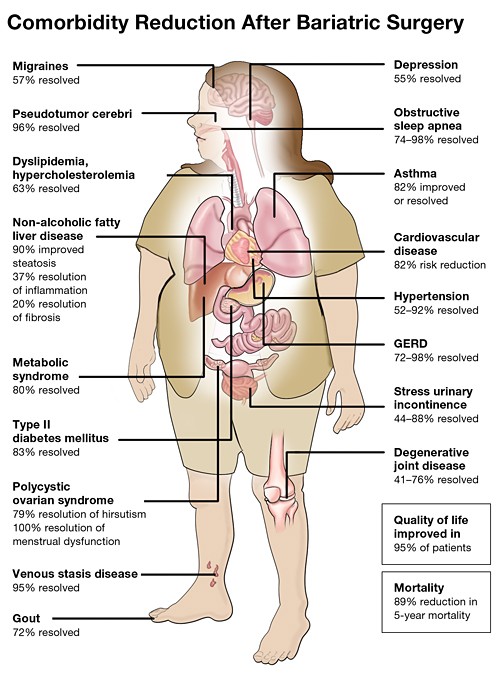The Facts on Obesity

Obesity is highly stigmatized and can be the source of discrimination for many people. The truth is that obesity is a medical issue: a chronic health condition that affects more than 40% of adults in the United States.1
Fortunately, this means that obesity can be medically treated.
At Panhandle Weight Loss Center in Amarillo, we provide a full range of surgical and non-surgical weight loss options. Our practice is founded on the belief that through advanced treatment and comprehensive, compassionate support, we can empower each of our patients to live a happier, healthier life.
It is important to remember that the habits and routines that brought you to the place where you need help did not occur overnight and similarly will not change overnight either. It’s a process. A process of learning, understanding, and incorporating the tools necessary to be successful long term. Our intention is to show you the immense personal power you have to control your health and fitness destiny by giving you the tools to reprogram your genes, reshape your physique, and enjoy a long, healthy, energetic, and productive life.
The Science of Weight Loss
Obesity is not the result of laziness or a lack of willpower, nor is obesity solely caused by overeating. And contrary to the belief of many in the medical community, it’s not about reducing your calorie intake. Calories have become the faceless enemy of your weight problems and are blamed indiscriminately for your failures in attaining your weight loss goals. Calories are not a brand, or particular food but reside in everything you consume. Consequently, you have been taught to believe if you will simply decrease your total calorie intake, you will lose weight. However, you are never given direction on where the reduction in these calories should come from.
But there is another problem as well. In the 1960’s health officials came to believe that dietary fat causes heart disease, and that carbohydrates are what these authorities would come to call “Heart Healthy.” This is why the famous Food Guide Pyramid of the USDA would later put fats and oils at the top, to be “used sparingly.” We now know that diets high in carbohydrates are primary contributors to the epidemic of obesity that has occurred over the last generation. So simply reducing calories without any regard to which calories are reduced does not lead to successful weight loss. Many other factors also increase a person’s likelihood of developing obesity are beyond his or her control, such as a genetic or familial predisposition, environmental factors, gender and age.

The rate at which the body burns calories, called the basal metabolic rate (BMR), is essential to regulating weight and can be impacted by a complex system of hormones, brain function, organ systems, and even sleep. Disruption to any of these factors can not only cause weight to accumulate, but is yet another reason the traditional strategy of calorie reduction has been proven to fail.
Obesity is a medical condition that requires a multifaceted approach with nutrition, fitness, lifestyle changes, and surgery at the core. While surgery is often an essential component of this approach, we believe very strongly that surgery is not a cure; it’s a tool. The weight loss specialists and medical professionals at Panhandle Weight Loss Center will guide you through a comprehensive program to successively guide you to life change.
Health Risks Associated with Obesity
People with obesity are at a higher risk for a number of serious health risks and diseases, including:
- Type II diabetes
- Coronary heart disease
- High blood pressure (hypertension)
- Sleep apnea and breathing problems
Obesity may also increase a person’s risk of developing certain types of cancer, such as breast cancer, esophageal cancer, colon cancer, pancreatic cancer, and uterine cancer.2

Obesity and Quality of Life
Obesity in and of itself can negatively impact a person’s quality of life, and this can be further impacted by stigmas and societal prejudices against people who struggle with this condition.
People with obesity may be more likely to suffer from depression and anxiety as well as low self-esteem and a poor body image. This may also make them more likely to engage in unhealthy behaviors such as binge eating, initiating a vicious cycle that can be difficult to break out of.In addition to the health and social consequences many people with obesity face, they may also face consequences to their personal finances. According to recent research, the actual annual cost of obesity is between $9,000 and $17,000 when compared to annual expenses of individuals of average weight. These figures are based on the higher cost of health care, medical insurance premiums, and prescription medications for people with obesity.3

Are You a Candidate for Our Weight Loss Programs?
Take our 60 Second Assessment
What is the Right Weight for You?
Every body is different in composition, which makes it difficult to establish universal standards for the definition of a “healthy weight.” For example, because muscle is denser than fat, a very muscular athlete may actually weigh more than a person of roughly the same size who has more fat than muscle on his or her body. Still, despite potential inaccuracies, the Body Mass Index (BMI) is a widely accepted tool used to determine whether a person’s body weight is in the healthy range.
While the numbers on a scale can indicate whether a person is carrying excess body weight, they don’t show the total picture. It’s best to establish your personal “healthy weight” goal in collaboration with your weight loss doctor, evaluating factors such as your overall health, level of activity, and the way you feel from day to day.
Diet and Weight Loss: Breaking the Cycle
Many people who struggle with obesity are tempted to engage in “quick fixes” like extreme or fad diets. While this may help them lose weight for a short time, it is usually neither sustainable nor healthy.
The most common outcome of what is commonly referred to as “yo-yo dieting” is weight regain: 75% of the weight lost this way is regained within 1 year, and nearly all is regained within 5 years. Additionally, weight loss accomplished purely through a calorie reduction approach typically yields a decrease in a person’s metabolism. Once the metabolism drops to a level at or below the new caloric intake, weight accumulation resumes and the previous weight loss returns.
The bottom line is that weight-loss regimens succeed when they get rid of the fattening carbohydrates in the diet; they fail when they don’t. What the regimen must do, in essence, is regulate insulin secretion which has been demonstrated to be the primary hormone responsible for the development of obesity. Nutritional platforms which control the release of insulin are paramount in maintaining the weight loss initiated through various surgical approaches.
Rather than “dieting,” it is healthier to engage in a lifestyle of wellbeing supported by consistently healthy food choices. Current medical literature and studies support a nutritional approach which significantly limits sugars and refined carbohydrates while focusing on healthy saturated fats, vegetables, and protein as the foundation of a healthy diet. There are ways to do this without compromising on taste and a feeling of satisfaction after eating, and working with a health coach you trust is a good first step to discovering which food choices work best for you.4,5
Exercise and Weight Management
The “eat less, exercise more” philosophy has been so deeply ingrained in our consciousness that it is often considered the one fact in the controversial science of health and lifestyle that must never be questioned. Scientific evidence is clear that regular exercise will not help us maintain our weight if we’re lean, or lose weight if we’re not! This may come as a surprise, but there is very little evidence to support the belief that the number of calories we expend during exercise has any effect on how obese we are.
That being said, there are indeed excellent reasons to exercise regularly. We can increase our endurance and fitness by doing so; we may live longer by reducing our risk of heart disease. We may simply feel better about ourselves, and it typically facilitates involvement in a much wider range of activities.6
Your Weight Loss Fitness Routine
Exercise is one component to achieving and maintaining a healthy weight, and the best workout routine is one you’ll stick to. If you’ve struggled to achieve a consistent fitness regimen, here are some tips that can help you stay moving and achieve your goals:
- Find exercises you like. Perhaps you enjoy the solitude of a solo walk or run. Or maybe you like more social activities, like dance classes. If mobility is an issue for you, try water therapy or chair yoga so you can get moving in a safe way.
- If you prefer to workout in a gym, make sure it’s convenient for you to get to.
- Enlist the support of a workout buddy or coach to help you stay accountable.
- Make working out part of your regular schedule. Note workouts on your calendar, as you would any other important appointment.
- Boost your mood by playing your favorite songs or listening to an audiobook while you work out.
- Set specific goals for your workouts, then reward yourself when you meet them. Perhaps your goal is climbing up and down a set of stairs a certain number of times without stopping, or walking a certain number of miles in a month. When you meet your goal, reward yourself with pampering or a healthy treat.
Exercise for Healthy Living
Increased physical activity is a necessary part of any healthy lifestyle, and regular exercise can help people with obesity become more fit and improve their physical and emotional health overall. Here are some types of exercise you may consider working into your fitness routine:
Low Impact Exercise
Low impact exercises are a great place to start, especially for people who live more sedentary lifestyles or struggle with mobility. These exercises can be gentle, and are easier on the joints and muscles than some more vigorous activities. Examples of low impact exercises for weight loss are swimming, chair yoga, and walking.
Aerobic Exercise
Aerobic exercise is designed to increase the heart rate, which improves cardiac function. Many weight loss patients find that cycling and swimming, which are both low impact and aerobic, are helpful additions to their workout routines. Be sure to discuss aerobic exercise with your doctor before hitting the gym.
Weight Lifting and Resistance Training
Weight lifting has been found to be very beneficial in helping people who struggle with obesity preserve muscle mass, and the American Heart Association recommends combining resistance training or weight lifting with aerobic exercise. By engaging in strength training exercises like pushups, squats, or lifting weights twice a week, you can improve muscle tone and increase fat burning.7
Our Panhandle Health & Wellness Center has personal trainers certified by the National Academy of Sports Medicine (NASM) and have additional certifications in corrective exercise. They are available to help you develop a customized and progressive exercise plan.
Surgical and Non-Surgical Weight Loss Options
Weight Loss Surgery
Obesity is a medical condition, and for many people obesity is most effectively treated with medical intervention in the form of weight loss surgery.
The concerns faced by people with obesity are far more than cosmetic: excess weight can have serious health consequences. Diet and exercise can help people lose some weight, but many factors that contribute to obesity are beyond a person’s control. For many individuals, weight loss surgery is the best and most effective means to losing weight and maintaining weight loss.
Weight loss surgery can help patients achieve increased mobility, alleviate pain, and enjoy a dramatically improved quality of life. In many cases, it can save a person’s life.

Weight Loss Surgery to Treat Obesity
Weight loss surgery is not the “easy way out” for people diagnosed with obesity. It is not a “cop out” because you are weak. Surgery has the ability to unlock weight loss processes in your system through a change in hormonal patterns that cannot be achieved simply through diet and exercise. It is through this mechanism that patients enjoy meaningful and sustainable weight loss when used in conjunction with a comprehensive weight loss program. Preparing for, recovering from, and adapting to the changes brought about by weight loss surgery takes a tremendous amount of dedication and commitment, but it’s worth it.
According to research, patients who undergo weight loss surgery are more likely to:
- Maintain weight loss years after surgery
- Achieve long-term remission of Type II diabetes
- Improve cardiovascular health
- Enjoy relief from depression
- Eliminate sleep apnea
- Reduce joint pain
- Improve fertility8
The Truth About Weight Loss: Myths and Misconceptions
Myth: I’m too overweight to exercise.
Fact: Especially when you’re starting out, any level of physical activity is an improvement that should be celebrated—and built upon. A knowledgeable coach can help you identify the right exercises for you and support you as you progress.
Myth: Weight loss surgery is the easy way out.
Fact: Weight loss surgery actually unlocks processes in your body that you don’t have access to otherwise by changing hormonal patterns involved in regulating your body weight “set point”. In addition, weight loss surgery requires dedication, commitment, and lifestyle changes for a patient to be successful. For many individuals with obesity, factors that contributed to their weight gain are beyond their control. Weight loss surgery is a tool; one step on the difficult journey to a healthier and happier life.
Myth: I’m too small for weight loss surgery.
Fact: Of the Americans who qualify for weight loss surgery, fewer than 1% actually undergo a procedure. A BMI over 30 is a key factor for candidates for weight loss surgery.9
Myth: Weight loss surgery is the end of the journey
Fact: Achieving and maintaining a healthy weight, even with weight loss surgery, is a life-long commitment—not a journey with a beginning and end. After weight loss surgery, patients may encounter setbacks as their bodies and lifestyles go through adjustments. This is why it’s so important to enlist the support of trainers, dieticians, and friends and family members.
Explore Your Weight Loss Options
At Panhandle Weight Loss Center, our entire team is dedicated to helping our patients achieve optimal health and weight loss success. We understand that weight loss is a continual journey, which is why we support our family of patients at every step: from diet and exercise guidance, to medically supervised weight loss, weight loss surgery, and the emergence into their healthier selves. If you would like to learn more about the surgical and non-surgical weight loss options available to you in Amarillo, please don’t hesitate to contact us.
1 Centers for Disease Control and Prevention. Adult Obesity Facts. Available: https://www.cdc.gov/obesity/data/adult.html. Accessed May 19, 2020.
2 Centers for Disease Control and Prevention. Adult Obesity and Cancer. Available: https://www.cdc.gov/obesity/adult/causes.html. Accessed Sept 19, 2023.
3 Thompson D, Edelsberg J, Colditz GA, Bird AP, Oster G. Lifetime health and economic consequences of obesity. Arch Intern Med. 1999;159(18):2177‐2183. doi:10.1001/archinte.159.18.2177. Accessed May 19, 2020.
4 Dulloo AG, Montani JP. Pathways from dieting to weight regain, to obesity and to the metabolic syndrome: an overview. Obes Rev. 2015;16 Suppl 1:1‐6. doi:10.1111/obr.12250. Accessed May 19, 2020.
5 Mayo Clinic. Obesity. Available: https://www.mayoclinic.org/diseases-conditions/obesity/symptoms-causes/syc-20375742. Accessed May 19, 2020.
6 Warburton DE, Nicol CW, Bredin SS. Health benefits of physical activity: the evidence. CMAJ. 2006; 174(6):801-809. doi:https://doi.org/10.1503/cmaj.051351. Accessed May 19, 2020.
7 Willis LH, Slentz CA, Bateman LA, et al. Effects of aerobic and/or resistance training on body mass and fat mass in overweight or obese adults. J Appl Physiol (1985). 2012;113(12):1831‐1837. doi:10.1152/japplphysiol.01370.2011. Accessed May 19, 2020.
8 Cleveland Clinic. 7 bariatric surgery benefits besides helping you lose weight. Available: https://health.clevelandclinic.org/7-bariatric-surgery-benefits-besides-helping-you-lose-weight/. Accessed May 19, 2020.
9 Bhogal SK, Reddigan JI, Rotstein OD, et al. Inequity to the utilization of bariatric surgery: a systematic review and meta-analysis. Obes Surg. 2015;25(5):888‐899. doi:10.1007/s11695-015-1595-9. Accessed May 19, 2020.
The surgeons at Panhandle Weight Loss Center have either authored or reviewed and approved this content. Page Updated:
